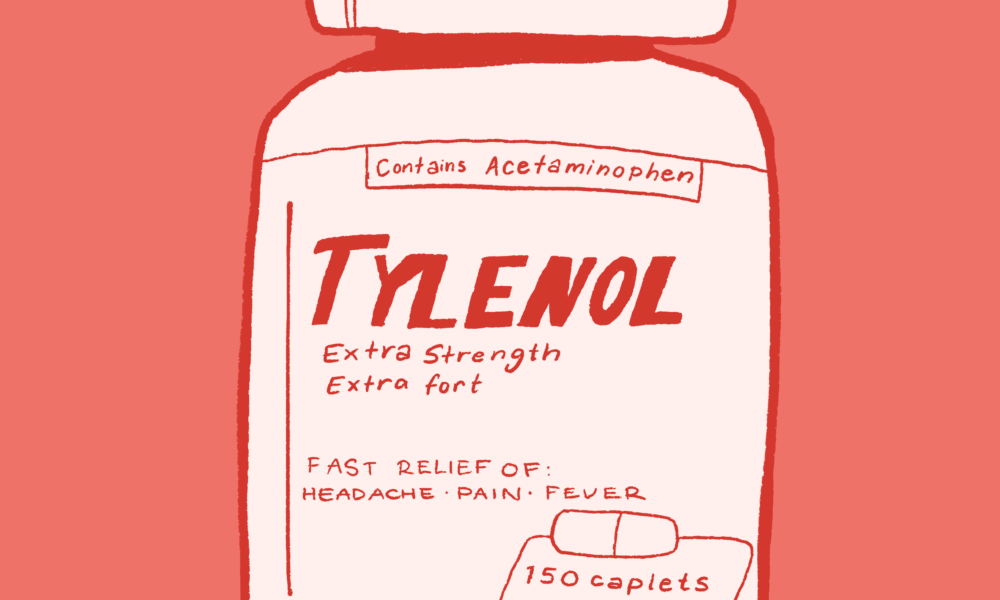If you have done any scrolling recently, whether on TikTok or a news feed, then you have likely seen that U.S. President Donald Trump claimed that using Tylenol during pregnancy can be “associated with a very increased risk of autism” in children, and that it is “not good.” His statement shook the medical world, with Health Canada quickly rejecting his assertion due to a lack of conclusive evidence.
To investigate why his claim is misleading, The Tribune spoke with Joe Schwarcz, director of McGill University’s Office for Science and Society and professor in the Department of Chemistry. He explained that while some studies suggest a link between autism and acetaminophen—the primary active ingredient in Tylenol products, as well as many other over-the-counter (OTC) and prescription medications—the evidence remains limited.
“There certainly have been studies that have shown a link,” Schwarcz said. “Now, these are what we call observational studies, which can never prove a cause-and-effect relationship. You just look at a population, you look at some variables, and see what you can […] make of it.”
He pointed to an alternative explanation for this link, highlighting instead the role of genetics. He noted that autism has a strong hereditary component, with inherited genetic variations contributing to its prevalence.
“The more likely explanation is that people who have a greater risk of giving birth to autistic children are also people who are more likely to take acetaminophen during pregnancy,” Schwarcz said. “People who are somewhere on that spectrum are more sensitive to pain and are more likely to pay attention to it, and therefore are more likely to take a painkiller like acetaminophen during pregnancy. So, it is very possible that if there is a link, as is suggested, it is not because [of] acetaminophen.”
Schwarcz also noted that existing research demonstrating a link between autism and acetaminophen faces many limitations.
“It’s very difficult to get proper statistical information from people about exactly what they have done during pregnancy,” he said.
Additionally, acetaminophen appears in many other medications, making surveys for data collection in research often inaccurate.
“Acetaminophen is the active [ingredient] in Tylenol, but many people may not know that, so that if they are asked, ‘Have you taken Tylenol?’, they’ll say no, but they may have taken one of the 600 other medications with a different name, which also contain acetaminophen,” Schwarcz said. “Or they may have taken a generic version of acetaminophen, or they may have taken some other drug that they think is acetaminophen. So these kinds of surveys are notoriously unreliable.”
Schwarcz further expanded on how Trump’s official announcement urging pregnant people to avoid Tylenol except under drastic conditions is harmful. Referring to Tylenol instead of acetaminophen signals out the brand’s marketing reputation, as other medications contain the same active ingredient. Moreover, acetaminophen is the safest OTC medicine in pregnancy to relieve fever and pain.
“High fevers and pain during pregnancy can cause a miscarriage. It can also result in kidney problems in the baby, and improper formation of the cerebrospinal fluid [….] Telling someone that they should grin and bear it, you know, when they’re pregnant, is absolutely the wrong advice,” he said. “You cannot, in pregnancy, use non-steroidal anti-inflammatory drugs, you can’t use Advil, you can’t use aspirin. The only one that you can use is acetaminophen, and it is very effective at reducing [elevated fever] temperatures.”
Untreated high fevers and pain during pregnancy pose serious potential risks to the fetus, meaning that better advice would be to use acetaminophen when one feels pain. Additionally, medications administered during pregnancy will include warnings advising pregnant individuals to consult a medical practitioner first. They exist to ensure the safety of both the parent and the developing fetus.
Therefore, fact or fiction: Does Tylenol consumption cause autism? Science shows it does not. While a small correlation exists, it is minimal and likely linked to other factors, not the active ingredient in Tylenol, acetaminophen. However, framing autism as a “dangerous outcome” to the point where individuals should avoid taking Tylenol places a stigma on people who have autism. President Trump’s claim reinforces harmful stereotypes, devaluing the experiences and identities of people with autism by portraying autism as something inherently negative or undesirable.









